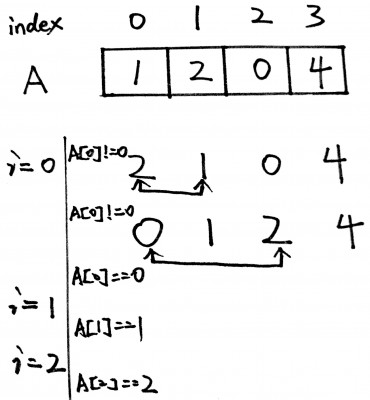Given an unsorted integer array, find the first missing positive integer. For example, given [1,2,0] return 3 and [3,4,-1,1] return 2.
Your algorithm should run in O(n) time and uses constant space.
Analysis
This problem can solve by using a bucket-sort like algorithm. Let’s consider finding first missing positive and 0 first. The key fact is that the ith element should be i, so we have:
i==A[i]
A[i]==A[A[i]]
For example, given an array {1,2,0,4}, the algorithm does the following:

int firstMissingPositiveAnd0(int A[]) { int n = A.length; for (int i = 0; i < n; i++) { // when the ith element is not i while (A[i] != i) { // no need to swap when ith element is out of range [0,n] if (A[i] < 0 || A[i] >= n) break; //handle duplicate elements if(A[i]==A[A[i]]) break; // swap elements int temp = A[i]; A[i] = A[temp]; A[temp] = temp; } } for (int i = 0; i < n; i++) { if (A[i] != i) return i; } return n; } |
Java Solution
This problem only considers positive numbers, so we need to shift 1 offset. The ith element is i+1.
public int firstMissingPositive(int[] A) { int n = A.length; for (int i = 0; i < n; i++) { while (A[i] != i + 1) { if (A[i] <= 0 || A[i] >= n) break; if(A[i]==A[A[i]-1]) break; int temp = A[i]; A[i] = A[temp - 1]; A[temp - 1] = temp; } } for (int i = 0; i < n; i++){ if (A[i] != i + 1){ return i + 1; } } return n + 1; } |
https://medium.com/@rohitverma_87831/find-first-missing-positive-integer-852b388ad147
we could use quick_select logic
lets take out positive only
then lets say exist K positives, lets divide around k/2 , one of half is going to have less than half elements
choose such half, repeat
Hi guys
I have created a small video trying to explain the O(n) time and O(1) space complexity approach, please check this out 🙂
https://www.youtube.com/watch?v=aWsoJLCXJNo
0 is not positive?
well my solution would be:
lets use quik_select shift negs into end of array, so it is
pos1 pos2 pos3… neg1 neg2n…
——–
from here we know #positives (K ), so lets mark index 0,,k-1 by making number negative.
so for (i=0… i less k-1 and arr[i] less k ) arr[ arr[i]]*=-1
after, it is just first positive M index is missed positive
Same solution but the i represents the numbers instead of the index in array, hence all the `-1`.
int findFirstMissingPositive(int[] nums)
{
for(int i = 1 ; i <= nums.length ; i++)
{
while (nums[i-1] != i)
{
int temp = nums[i-1];
if (temp-1 = nums.length ||
nums[temp-1] == temp)
{
break;
}
nums[i-1] = nums[temp-1];
nums[temp-1] = temp;
}
}
for(int i = 1 ; i <= nums.length ; i++)
{
if (nums[i-1] != i) return i;
}
return nums.length;
}
You are mixing 2 different questions. Here question is to find first missing positive number and the link refers to finding missing number in a range of consecutive numbers
What about the XOR method from http://www.geeksforgeeks.org/find-the-missing-number/?
1) find min and max in linear time
2) let x1 = XOR from the min value to max value
3) let x2 = XOR of all values in input
4) ans is XOR of x1 and x2
function findMissingXor($inputs) {
$min = PHP_INT_MAX;
$max = -PHP_INT_MAX;
$xorInputs = 0;
foreach($inputs AS $v) {
if ($v $max) $max = $v;
$xorInputs ^= $v;
}
$xorSum = 0;
for ($i = $min; $i <= $max; $i ++ ) {
$xorSum ^= $i;
}
$ans = $xorInputs ^ $xorSum;
if ($ans == 0) return $max + 1;
else return $ans;
}
http://ideone.com/zHlnIV
if the array is [-2,-3,-4,-8], it should return 1
thus for java offset version->
return (A[n-1]<=0)? 1: A[n-1]+1;
Three things:
1. The two code snippets are different in the second loop
2. Special case when n == 0
3. The final return statement should be return A[0] == n ? n + 1 : n;
Think about 4,3,2,1 (should return 5) and 5,3,2,1 (should return 4)